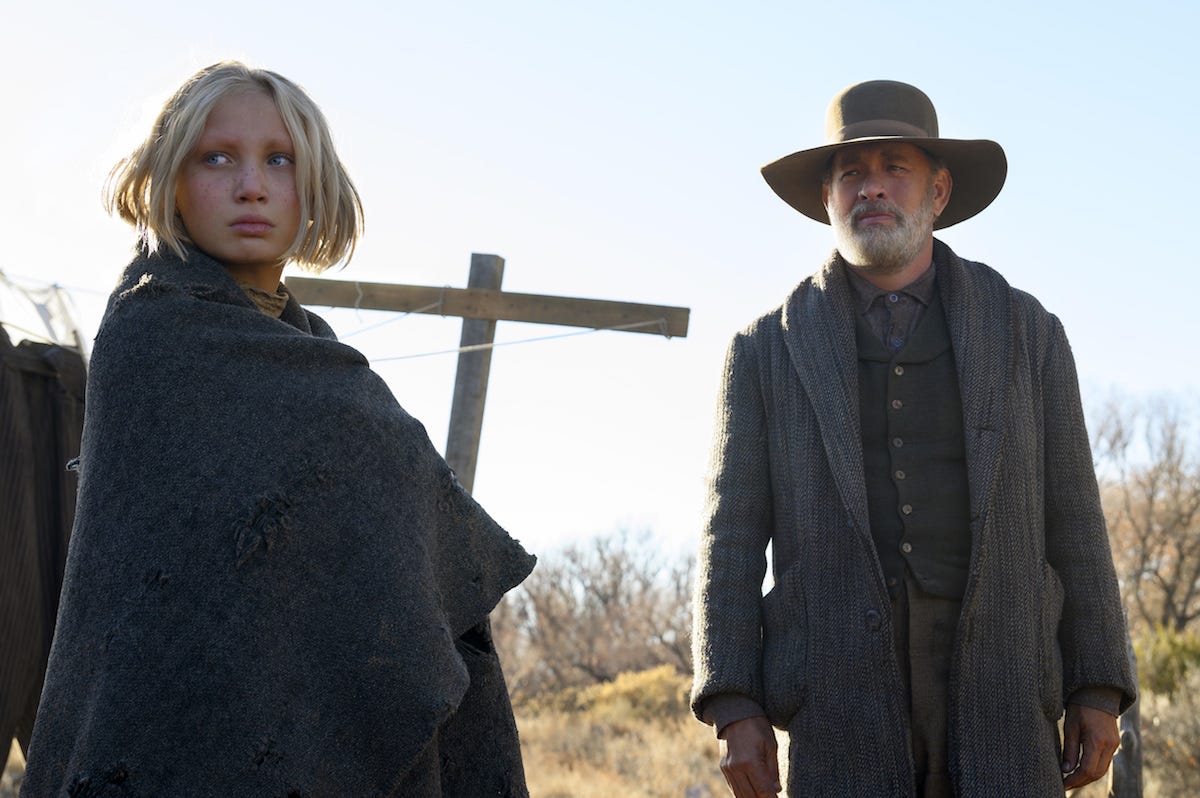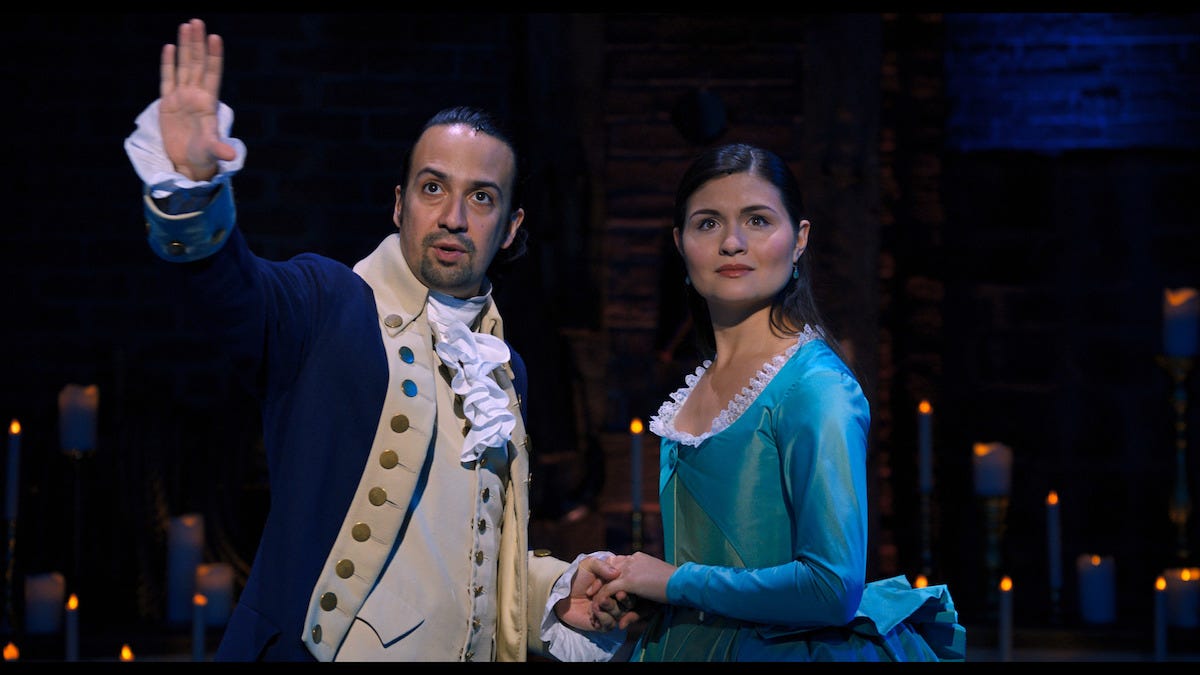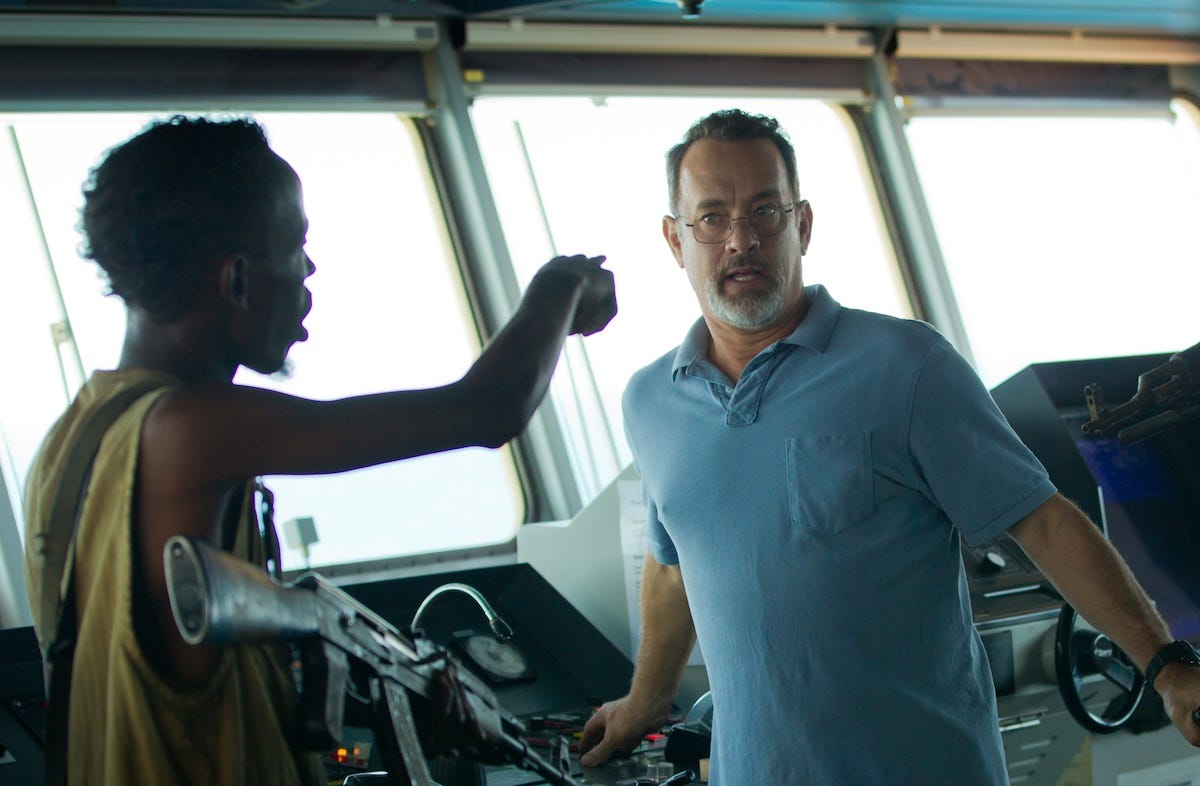Can Reporting Change the World?
The new Tom Hanks movie, "News of the World," reviewed. Plus: The Age of Scission!
Review: News of the World (PVOD and Theaters Now)
There’s a moment midway through News of the World that will either be too hokey for your taste or appropriately earnest, a soothing balm against the roughness of modernity’s sores. Which way you lean will probably determine how much you’ll enjoy the picture.
Captain Jefferson Kyle Kidd (Tom Hanks) has been shanghaied by one Merritt Farley (Thomas Francis Murphy), a petty tyrant who has claimed Texas’s Erath County for himself. Captain Kidd travels the trails, charging a dime a head from folks who want to hear about the world beyond their borders; Farley demands he hold a reading for those who work like dogs in his town, skinning buffalo by the dozen and slaughtering Indians at the same pace. Wary, but sensitive to the danger this Farley presents not only to him but also his young charge, Johanna (Helena Zengel), a girl of German extraction raised by Kiowa following a raid on her homestead, Captain Kidd agrees to do the reading.
The small dinginess of Erath contrasts with the beauty of the open country and the grandeur of previous stop on the reading trail, Dallas. Kidd’s reading in Erath is outdoors, lit not by oil lamps but by burning torches. Bottles of booze are passed around as men and women hang off of one another. The staging and the lighting by Paul Greengrass practically screams, “Be careful what you say: this is a mob.”
Kidd reads not from the Erath Journal but from a northern periodical, Harpers Illustrated, highlighting a story about a group of miners in Pennsylvania caught underground and fighting off a fire. Poor people, people oppressed by a Farley of their own. Erath’s citizens, this gathered mob, are roused by Kidd’s reading—perhaps there is a better life for them, after all—and Farley is nonplussed. He demands Captain Kidd read from the Journal. To tell the assembled rabble stories they already know.
“The sort of thing these people expect to hear,” as Farley puts it. You can almost hear him muttering under his breath “feed them fake news.”
But the people don’t want to hear what they expect! Their voices rise in opposition, demanding to know more about the coal miners, about the world outside their little warren. A better world. So, naturally, Farley tries to kill Captain Kidd. And, equally naturally, one of the townsfolk—a soft-headed boy named Fred (John Calley) enthralled by Captain Kidd’s storytelling—is inspired to rise up against the town’s wicked ruler, slaying one of his minions and allowing Kidd and Johanna to escape.
News of the World is quite good, the sort of amusingly revisionist western that treats the cavalry with mistrust while keeping the brutality of the Kiowa tastefully offscreen. All we see of their violence against Johanna’s family is faded blood spatters and a stray arrow in a door frame. The Kiowa are practically elvish in their bearing, Greengrass shooting them on the march while weather shrouds them from our sight; they’re first seen across a river in a thunderstorm and later within a sandstorm, stoic ghosts in the mist sailing into the west. Hanks radiates fatherly assurance, while Zengel is nearly feral as the girl who has been made an orphan twice over. There is action and adventure, there are Western landscapes, there are men looking to redeem themselves and find purpose in the world.
But the western tropes exist merely to serve this little vignette in the middle of the movie: The power to change the world through storytelling is the crux of the matter. And while the intention is undoubtedly good, I wonder if it’s not just a little bit Pollyannish. Because the problem with the world, as we’ve seen in the last few years, isn’t that people are force-fed fake news though they yearn for something better.
The problem is that they want fake news. It’s that they want to hear stories about their brave leaders protecting them from filthy outsiders. It’s that they want to be cocooned in a reality of their choosing, one where facts don’t matter altogether much. And if the Erath Journal, by some miracle, started presenting news that made them uncomfortable, well, they’ll just pick up ErathMax or One Erath News.
I admire Paul Greengrass, who got his start in the world of journalism, for maintaining his faith in the power of the pen to shape the world in a more pleasing way. I’m not sure I share it any longer.
The Age of Scission
(Pictured above: a niche program in the Age of Scission.)
One of the more pleasing aspects of News of the World is the idea of people coming together to hear stories chosen by a stranger to help them make sense of their world. News from locales near and far compiled to give them a better idea of the universe in which they live, a common frame of reference. Sometimes those stories are deadly serious, as when Captain Kidd relays the mounting death toll from a meningitis outbreak; others are funnier and more playful, as when he relays a story of a man who was buried too early and interrupted a wedding with his entombed pleas for help.
We don’t really live in such a world any longer; everyone is their own assignment editor and the algorithms that surround us on Facebook and Instagram and Twitter and YouTube are designed to feed us more of the same, to reinforce our views and our notions. Ours is a more fractured world, one in which it’s harder to determine what experiences are communal and what are niche.
As I suggested in my newsletter last week, we live in The Age of Scission. And there’s no better way to understand that scission than trying to determine answers to what would, once upon a time, have been rather simple questions: In 2020, what was the biggest TV show and what was the biggest movie?
Now, “biggest” can have several meanings: critical prestige versus raw viewership versus viewership in “the demo” for TV; raw box office versus per-screen averages versus Oscar gold for movies. But, generally speaking, “biggest” means “most watched.”
As one of my favorite writers, the Entertainment Strategy Guy, demonstrates, we have no idea how to answer that question now in any sort of concrete way. Oh, we can make gestures toward what was most popular by looking at Nielsen data and Google searches and “datecdotes” released by Netflix. But it’s all a black box. When the ESG suggests that Tiger King was the biggest show of 2020, I have no reason to doubt him and no ability to conjure up a particularly persuasive counter.
Wonder Woman 1984 likely drove the most signups of any individual movie to any individual service, and for that HBO Max is undoubtedly grateful, but it received mediocre reviews and we don’t, you know, know how many people actually watched it. The Nielsen data suggests Hamilton was the most-watched non-kids movie in America, though I don’t think there’s any reason to exclude movies for kids! After all, what has film become but a means of narcotizing our five-year-old children so they’ll give us a moment’s peace? Maybe Frozen II and Moana really are the biggest movies of the year?
But maybe “what’s the biggest” is simply no longer an operative question. In the Age of Scission, even the biggest hits are relatively small. Perhaps we need a new way of thinking about measuring impact and influence.
Assigned Viewing: Captain Phillips (free with ads on Prime)
Greengrass and Hanks previously worked together on Captain Phillips, which chronicled the efforts of Richard Phillips (Hanks) to save his crew and his ship from Somali pirates who had hijacked his container vessel. Captain Phillips, like News of the World, is about an everyman trying to keep innocents from harm while also navigating a cultural clash and the shifting tides of a changing world. And Captain Phillips, like News of the World, features some solidly rousing action and impressive suspense, given that we all know how that story turned out.
What Captain Phillips has that News of the World lacks is a compelling villain: Abduwali Muse, played by Barkhad Abdi. Emaciated and ferocious, Abdi’s “I’m the captain now” entered the lexicon as a meme. But his is a subtle, sad performance, one that doesn’t excuse Somali piracy even as it humanizes those who choose this particularly dreadful line of work.





